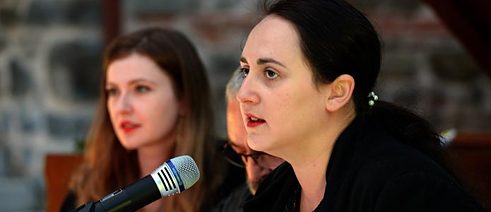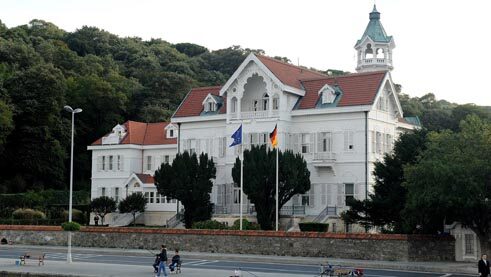Villa Tarabya
Nino Haratischwili in Istanbul

The multiple award-winning writer and theatre director Nino Haratischwili comes from Georgia, lives in Hamburg and presently holds a scholarship for a residency at the Kulturakademie Tarabya in Istanbul. There, the 34-year-old author of the novel The Eighth Life is living and working for three months on the grounds of the former summer home of the German ambassador.
How do you as a writer make use of the Kulturakademie Tarabya scholarship?
I can concentrate on my work much more here than at home, where there are many distractions and there’s always something else to do. But in the Villa Tarabya, I am largely shielded from everyday life in Germany and enjoy the luxurious location in solitude. You live right next to a forest here, a half hour by bus to the centre of Istanbul with all its temptations. You have the sea at your doorstep, and the idyllic suburb has everything you need.
For the first time, I’m here with my husband and child, our ten-month-old daughter Kyra, which makes me very happy. Most scholarships abroad don’t allow you to take your family along. For me, that sounds as if an author is forced to decide to be either only an artist or only a mother, which in my eyes is entirely out of touch with real life.
 Villa Tarabya on the European side of Istanbul
| Photo: Sedat Mehder
Do you also have contact to other places and to artists outside your city?
Villa Tarabya on the European side of Istanbul
| Photo: Sedat Mehder
Do you also have contact to other places and to artists outside your city?
Whenever the walls start closing on me, I can fall back on the network of the Kulturakademie Tarabya. It allows me to get to know the city and its residents beyond touristic pathways, and to find out where interesting exhibitions or jam sessions are being held. Still, it’s easier to make contact with musicians and visual artists – who are constantly meeting somewhere – than with writers, for whom there’s the added language barrier.
Fortunately, my book The Eighth Life has been translated into Turkish. Soon I will be part of a joint reading and discussion with a Turkish author. The book fair, which opened early November in Istanbul, was also a place for exciting conversations.
In your privileged situation, do you learn anything about the difficult political circumstances of Turkish civil society?
As an outsider, I cannot make any generalisations. Close up, the situation is far more differentiated than one would think from afar in Germany. I am certainly experiencing a vibrant arts scene in the city. But on the other hand, I do notice that personal stories about people that you know well tear stories from their usual anonymity and I am more emotionally moved than if I had only learned about it through the media.
Before you came here, did you struggle with the idea of coming to Istanbul for a scholarship in these politically uncertain times?
My friends’ opinions, in particular, were divided. Some didn’t think that was a good idea. But, if you have that attitude, you can hardly travel to any country today. It reminds me of discussions I had years ago when I spent some time in Russia to research another book. I think it’s important to be in Turkey right now. Also, most of the artists in Istanbul keep saying how much exchange means to them.
How does an exchange like this work? You already held a scholarship a year ago in Istanbul.
The Goethe-Institut helps us scholarship holders to come into contact with Turkish artists and cultural workers. Turkish writers are very interested in encounters and co-productions. Many colleagues also find it very interesting that I don’t write in my native language.
It certainly seems to beg an explanation that you – a Georgian – have chosen German as your mode of expression.
That was not so much a conscious decision that I made than one that made me! As a teenager, I accompanied my mother when she moved to Germany for two years for professional reasons, so I was able to speak the language pretty well when I started my theatre directing studies in Hamburg in 2003. While preparing my own first play, I thought it might be easier to write in German from the start instead of translating it later.
Ultimately, that also involved maintaining a certain distance in relation to what I was writing about. Meanwhile, I’ve lived in Hamburg for thirteen years, and the German language has become a kind of home to me that I rarely question anymore. On the contrary, it even gives me a lot of leeway. Because when you come from a different culture and encounter a foreign language, you always make it your own in one way or another.